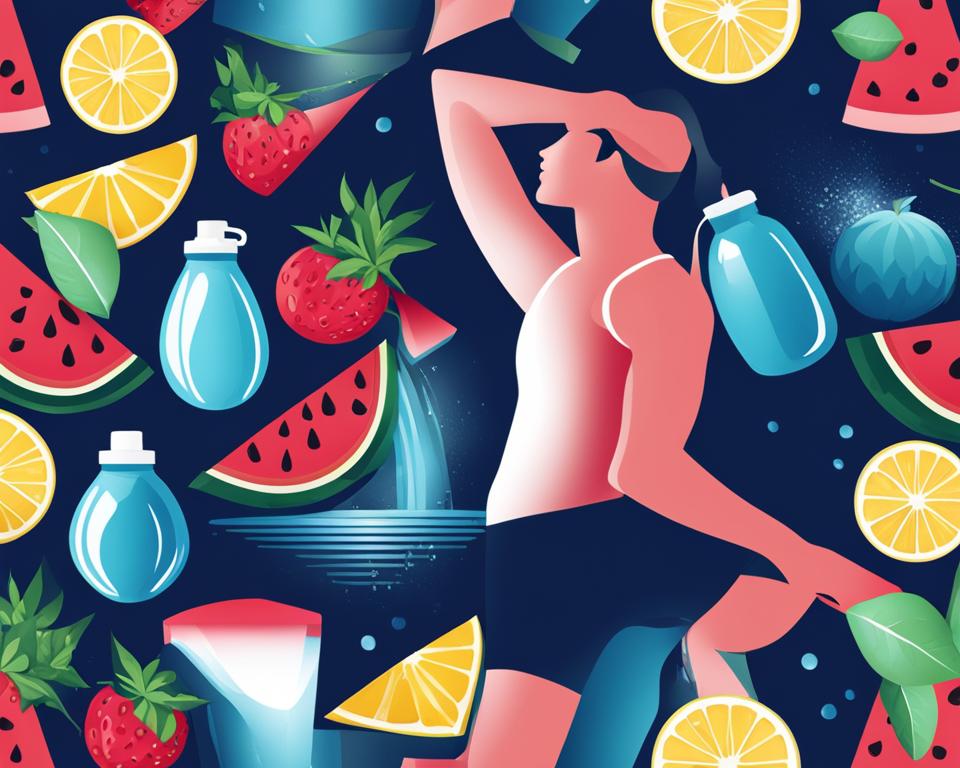When it comes to sports and fitness success, nutrition can be the game-changer. As an athlete, I understand the crucial role that proper nutrition plays in achieving peak performance. It goes beyond just eating healthy; it’s about fueling your body for exercise, optimizing your diet for athletic performance, and tailoring your nutrition plan to meet your individual needs.
Sports nutrition and diet are the cornerstones of athletic excellence. Performance nutrition involves strategic meal planning, considering macronutrient and micronutrient requirements, timing of meals, and even hydration. By understanding the fundamentals of sports nutrition and implementing the right strategies, athletes can gain a competitive edge and reach their full potential.
Key Takeaways:
- Sports nutrition and diet are essential for athletes to achieve optimal performance and success.
- Macronutrients like carbohydrates and protein play a vital role in energy production and muscle repair.
- Hydration is crucial for joint lubrication, temperature regulation, and nutrient transport.
- A personalized nutrition plan, designed with the help of a sports dietitian, can maximize results.
- Nutrition counseling and meal planning are key components of a successful athlete diet plan.
Unlocking the Power of Sports Nutrition and Diet
Sports nutrition and diet are vital for unlocking an athlete’s full potential. A well-designed nutrition plan can significantly enhance athletic performance, fueling the body with the necessary nutrients for optimal function and recovery. To achieve peak athletic performance, it is essential to understand the importance of macronutrients and micronutrients in the diet.
Macronutrient Mastery for Peak Athletic Performance
Macronutrients, including carbohydrates, proteins, and fats, are the basic building blocks of sports nutrition. Each macronutrient serves a specific role in providing energy, supporting muscle repair, and maintaining overall health. Carbohydrates serve as the primary source of energy for physical activities, while proteins play a crucial role in muscle repair and growth. Fats provide sustained energy during endurance exercises and aid in the absorption of fat-soluble vitamins.
Tailoring Micronutrients for Enhanced Physical Capabilities
In addition to macronutrients, micronutrients play a crucial role in an athlete’s diet. Micronutrients, such as vitamins and minerals, are essential for various bodily functions and can optimize physical capabilities. For example, calcium and vitamin D are vital for bone health, while iron and B vitamins are important for energy production and red blood cell formation. Tailoring the intake of these micronutrients according to individual needs can maximize performance and support overall health.
Designing an Athlete Diet Plan for Optimal Results
When it comes to achieving optimal results in sports, designing a customized athlete diet plan is of utmost importance. An athlete’s diet plan should be carefully crafted to meet their specific needs and goals, taking into account factors such as macronutrient requirements, meal timing, and the inclusion of nutrient-dense foods.
To create an effective athlete diet plan, it is recommended to work with a sports dietitian. A sports dietitian has expertise in sports nutrition and can provide personalized guidance based on an athlete’s individual requirements and performance goals. They can analyze an athlete’s current diet, assess nutrient deficiencies, and recommend necessary adjustments to optimize performance.
One key aspect of designing an athlete diet plan is determining the macronutrient ratios that best support the athlete’s training regimen. Depending on the sport and training intensity, the amount of carbohydrates, proteins, and fats needed may vary. Carbohydrates are essential for providing energy during exercise, while proteins are necessary for muscle repair and recovery. Healthy fats also play a role in supporting overall health and performance.
Another important consideration in designing an athlete diet plan is the timing of meals. Fueling the body appropriately before and after exercise is crucial for optimizing performance. Consuming a combination of carbohydrates and proteins before exercise can enhance energy levels and muscle function, while eating a balanced meal after exercise aids in muscle recovery and glycogen replenishment.
The inclusion of nutrient-dense foods is also a key component of an athlete’s diet plan. Nutrient-dense foods provide essential vitamins, minerals, and antioxidants that support overall health and performance. Examples of nutrient-dense foods include fruits, vegetables, lean proteins, whole grains, and healthy fats.

Working with a sports dietitian ensures that an athlete’s diet plan is tailored to their specific needs and goals. By carefully considering macronutrient requirements, meal timing, and nutrient-dense foods, athletes can fuel their bodies properly and achieve optimal results in their respective sports.
Leveraging Performance Nutrition for Competitive Advantage
Performance nutrition is a key factor in gaining a competitive advantage in sports. Athletes understand the importance of fueling their bodies with the right nutrients to optimize their performance. In this section, we will explore the role of carbohydrates and protein in high-intensity sport activities, focusing on their impact on energy levels, muscle growth, and recovery.
The Role of Carbohydrates in High-Intensity Sport Activities
Carbohydrates are the primary source of energy for high-intensity sport activities. They provide the fuel that athletes need to perform at their peak. Consuming quality carbohydrates before and during exercise can enhance performance by replenishing glycogen stores and preventing fatigue.
Carbohydrates can be found in foods such as whole grains, fruits, and vegetables. Athletes should aim to include carbohydrates in their pre-workout and post-workout meals to optimize their energy levels and support their training regimen.
Protein: Building Blocks for Muscle Growth and Recovery
Protein plays a crucial role in muscle growth and recovery. During high-intensity sport activities, muscle fibers undergo damage and breakdown. Consuming adequate amounts of protein helps repair and rebuild these muscles.
Protein-rich foods such as lean meats, dairy products, and legumes should be included in an athlete’s diet to support muscle growth and recovery. Additionally, protein supplements can be a convenient way to ensure athletes meet their protein requirements, especially during periods of intense training.
In conclusion, leveraging performance nutrition can provide athletes with a significant competitive advantage. By understanding the role of carbohydrates in high-intensity sport activities and the importance of protein for muscle growth and recovery, athletes can optimize their diet to fuel their bodies for success.
Consulting a Sports Dietitian: Tailored Advice for Athletes
Consulting a sports dietitian is crucial for athletes who seek personalized and tailored advice to optimize their nutrition. A sports dietitian possesses specialized knowledge and expertise in developing nutrition plans tailored to athletes’ unique needs. Their guidance encompasses essential aspects such as macronutrient and micronutrient intake, meal timing, hydration, and supplementation. By engaging with a sports dietitian, athletes can ensure that their diet aligns with their specific sport and performance goals.

Working closely with a sports dietitian allows athletes to receive comprehensive nutrition counseling aimed at maximizing their athletic potential. Through a personalized approach, the dietitian analyzes and understands individual requirements, training routines, and dietary preferences. This enables the dietitian to develop a nutrition plan that optimizes performance, enhances recovery, and supports overall health.
“A sports dietitian can provide athletes with the knowledge and tools they need to fuel their bodies for optimal performance and achieve their goals.”
Sports dietitians assess the athlete’s current dietary habits and make recommendations based on their specific needs. They consider factors such as energy expenditure, nutrient requirements, and any dietary restrictions or allergies. This individualized approach ensures that athletes receive tailored advice that enhances their performance and overall well-being.
Additionally, sports dietitians can guide athletes on the importance of hydration and proper fluid intake. They educate athletes on strategies to maintain optimal hydration levels during training and competition, taking into account factors such as sweat rates and electrolyte balance.
Furthermore, sports dietitians stay updated on the latest research and advancements in sports nutrition. They can offer evidence-based recommendations on supplementation and help athletes navigate the overwhelming array of products on the market, ensuring they make informed choices that align with their goals.
By consulting a sports dietitian, athletes gain a partner in their nutrition journey, receiving ongoing support and accountability. Through regular check-ins and adjustments to the nutrition plan, athletes can fine-tune their diet to optimize their performance and achieve their athletic goals.
Overall, a sports dietitian provides athletes with a competitive edge by delivering tailored advice and guidance that goes beyond basic nutrition information. They are instrumental in helping athletes achieve their full potential through proper nutrition, ultimately shaping the trajectory of their athletic careers.
Strategic Meal Planning for Athletes
Strategic meal planning plays a crucial role in maximizing the performance of athletes. By carefully planning meals before, during, and after training, athletes can ensure they are fueling their bodies properly with the necessary energy and nutrients. This approach not only enhances sports performance but also aids in the recovery process, allowing athletes to optimize their training results.
Eating Before, During, and After Training
Proper nutrition before, during, and after training sessions is key for athletes.
Eating Before Training:
Consuming a balanced meal or snack before training provides the necessary fuel for optimal performance. It is recommended to include a combination of carbohydrates and protein to provide energy and enhance muscle function. Carbohydrates serve as the primary source of energy, while protein aids in muscle repair and growth.
Eating During Training:
In certain cases, eating during prolonged training sessions or events can help sustain energy levels and prevent fatigue. Athletes may incorporate easily digestible carbohydrates, such as energy gels or sports drinks, to maintain their performance and delay the onset of fatigue.
Eating After Training:
Post-training nutrition is crucial for recovery and muscle repair. Consuming a balanced meal or snack that includes carbohydrates and protein within 30 minutes to 2 hours after training helps replenish glycogen stores and promotes muscle tissue repair.
Nutrient Timing and Its Impact on Sports Performance
Nutrient timing refers to the strategic consumption of specific nutrients at specific times to optimize sports performance.
Carbohydrate Timing:
Consuming carbohydrates before and during training provides the necessary energy for performance. Pre-exercise carbohydrates help top off glycogen stores, while intra-workout carbohydrates can sustain energy levels.
Protein Timing:
Timing protein intake after exercise is crucial for muscle repair and growth. Consuming protein within the post-training window enhances muscle recovery and supports adaptation to training.
Fat Timing:
Fat intake should be moderated before training to avoid discomfort and promote easier digestion. However, including healthy fats in post-training meals can provide additional energy and promote satiety.
Note: Nutrient timing is highly individualized, and athletes should consult with a sports dietitian to create a personalized plan that suits their specific needs and training demands.
| Pre-Training Meal | Intra-Training Snacks | Post-Training Meal |
|---|---|---|
| Whole grain toast with peanut butter and banana slices | Energy gel or sports drink | Grilled chicken breast with brown rice and steamed vegetables |
| Greek yogurt with berries and granola | Trail mix with dried fruit and nuts | Salmon with quinoa and roasted asparagus |
| Oatmeal with almond butter and sliced apples | Homemade protein bar | Lean beef stir-fry with whole wheat noodles |
Table: Sample meals for different training phases
Healthy Eating for Athletes: A Day in the Plate
Eating a nutritious and well-balanced diet is vital for athletes to optimize their performance and maintain overall well-being. By prioritizing whole foods over supplements, athletes can ensure they are getting a wide range of essential nutrients from natural sources. Additionally, incorporating a variety of colorful foods into their diet can help prevent injuries and support optimal health.
So, what should athletes include in a day of healthy eating? Here’s an example of a plate that consists of nutrient-dense meals and snacks to fuel their bodies:
| Meal | Foods |
|---|---|
| Breakfast | A bowl of oatmeal topped with fresh berries and sliced almonds, a side of Greek yogurt, and a glass of orange juice. |
| Morning Snack | A banana and a handful of mixed nuts. |
| Lunch | A grilled chicken salad with a variety of vegetables such as spinach, tomatoes, cucumbers, and carrots. Add a drizzle of olive oil and balsamic vinegar as dressing. |
| Afternoon Snack | Carrot sticks with hummus. |
| Dinner | Grilled salmon with quinoa and steamed broccoli. |
| Evening Snack | An apple with peanut butter. |
Remember, this is just one example, and the exact meals and snacks can vary based on individual preferences, dietary restrictions, and training goals. The key is to emphasize whole foods, incorporate a wide variety of colorful fruits and vegetables, and ensure a balance of macronutrients and micronutrients.
Whole Foods Over Supplements: What Should Athletes Eat?
When it comes to nutrition, whole foods should be the primary focus for athletes. Whole foods refer to natural, unprocessed foods that are rich in nutrients and free from additives or preservatives. These foods provide a wide range of essential vitamins, minerals, and antioxidants that are beneficial for overall health and performance.
Here are some examples of whole foods that athletes should incorporate into their diet:
- Fresh fruits and vegetables: These colorful and vibrant foods provide a wide range of vitamins, minerals, and antioxidants that support immune function, muscle recovery, and injury prevention.
- Lean proteins: Foods like lean meat, poultry, fish, eggs, and legumes are excellent sources of protein, which is essential for muscle repair, growth, and overall recovery.
- Whole grains: Foods like brown rice, quinoa, oats, and whole wheat bread contain complex carbohydrates that provide sustained energy for workouts, training, and competitions.
- Healthy fats: Sources of healthy fats include avocados, nuts, seeds, and olive oil. These fats provide important nutrients and help maintain healthy joints and hormone balance.
- Dairy or dairy alternatives: Milk, yogurt, and cheese are rich in calcium and other essential nutrients, promoting bone health and aiding in muscle function.
While supplements can play a role in supporting an athlete’s nutrition, they should be used as a complement to a healthy diet rather than a replacement for whole foods. It’s important to consult with a sports dietitian or healthcare professional before adding any supplements to ensure they are safe and meet individual needs.
The Significance of Colorful, Varied Diets for Injury Prevention
Adopting a colorful and varied diet is not only visually appealing but also essential for injury prevention among athletes. Different colored fruits and vegetables offer a diverse array of antioxidants, phytochemicals, and other compounds that provide protective effects against oxidative stress and inflammation.
Eating a variety of colorful foods can contribute to injury prevention in the following ways:
- Supporting joint health: Some colorful fruits and vegetables contain compounds that have been shown to support joint health and reduce the risk of injuries such as arthritis and tendinitis.
- Boosting immune function: Certain antioxidants found in brightly colored foods can enhance immune function, reducing the likelihood of infections and illnesses that could hinder athletic performance.
- Enhancing recovery: The combination of antioxidants, vitamins, and minerals found in colorful foods can aid in muscle recovery post-workout and reduce inflammation, allowing athletes to bounce back faster and minimize the risk of overuse injuries.
- Improving overall health: Eating a variety of colorful foods ensures a diverse intake of nutrients, which is essential for maintaining overall health and well-being. A strong and healthy body is better equipped to handle the physical demands of sports and reduce the risk of injuries.
By incorporating a wide range of colorful fruits, vegetables, and other plant-based foods into their diet, athletes can provide their bodies with the necessary nutrients to support optimal performance, recovery, and injury prevention.
Nutritional Strategies for Sports: What the Science Says
Scientific evidence supports the effectiveness of various nutritional strategies for sports. Through research studies, insights have been gained into the impact of specific nutrients, meal timing, and supplementation on athletic performance. Understanding the science behind these nutrition strategies empowers athletes to make informed decisions about their diet, ultimately optimizing their performance.
For example, studies have provided valuable information about the role of carbohydrates as the primary source of energy for high-intensity sport activities. Consuming quality carbohydrates before and during exercise has been shown to enhance performance.
Moreover, research has highlighted the importance of protein in muscle growth and recovery. Athletes who consume adequate amounts of protein support their training regimen and promote optimal muscle repair.
Furthermore, scientific evidence suggests that the timing of meals can significantly impact sports performance. Strategic meal planning and nutrient timing can enhance energy levels, improve recovery, and support muscle growth.
Supplementation is another area where scientific studies have contributed valuable insights. With proper guidance and evidence-based knowledge, athletes can identify supplements that may enhance their performance and support their specific training goals.
By staying informed about the scientific evidence backing nutritional strategies for sports, athletes can personalize their approach to diet and make choices that positively impact their performance on the field or in competition.

Hydration: The Unsung Hero of Athletic Success
When it comes to athletic success, hydration is often overlooked. Yet, it plays a crucial role in supporting optimal performance and overall well-being. Proper hydration helps maintain electrolyte balance, which is particularly important for athletes engaged in endurance sports.

Maintaining Electrolyte Balance for Endurance Sports
Endurance sports, such as long-distance running, cycling, and swimming, place significant demands on the body. During intense physical activity, electrolytes are lost through sweat, which can lead to imbalances and impact performance. Electrolytes, such as sodium, potassium, and magnesium, play a critical role in maintaining proper muscle function, nerve transmission, and fluid balance.
It’s essential for athletes participating in endurance sports to prioritize electrolyte balance. Regular hydration with electrolyte-rich fluids is key to replenishing these lost minerals and ensuring optimal physical performance. Sports drinks specifically designed for endurance athletes can provide hydration and electrolyte replenishment during prolonged training sessions and competitions.
When Water Isn’t Enough: Choosing the Right Hydration Supplements
While water is a fundamental hydration source, it may not always be sufficient, especially for athletes engaged in prolonged and intense exercise. Hydration supplements can offer an additional advantage by providing a concentrated source of electrolytes and other essential nutrients.
When choosing hydration supplements, athletes should consider factors such as taste, ease of consumption, and the specific electrolytes included. Look for products that are designed to support hydration during exercise and contain a balanced blend of electrolytes. Additionally, some hydration supplements may also provide carbohydrates to fuel muscles during prolonged activity.
It’s important to note that hydration supplements should be used in conjunction with adequate water intake. Athletes should consult with a sports dietitian or healthcare professional to determine the most suitable hydration strategy based on individual needs and training goals.
In conclusion, hydration is an unsung hero when it comes to athletic success. Proper hydration not only supports electrolyte balance, but it also helps athletes perform at their best, enhance endurance, and reduce the risk of dehydration-related issues. Incorporating hydration supplements, alongside regular water consumption, can offer additional benefits for athletes engaged in endurance sports.
The Role of Nutrition Counseling for Athletes
Nutrition counseling plays a significant role in optimizing an athlete’s diet and performance. A personalized nutrition plan is essential to meet individual requirements and goals. Nutrition counselors work closely with athletes to design and implement a tailored diet that supports their specific needs. By providing expert guidance on nutrient intake, meal timing, and hydration, nutrition counselors help athletes reach their full potential.
Personalizing Nutrition for Individual Athlete Requirements
Each athlete has unique dietary requirements based on factors such as sport, training intensity, body composition goals, and health conditions. Nutrition counselors take all these factors into account to develop a personalized nutrition plan. By analyzing an athlete’s preferences, dietary restrictions, and performance goals, nutrition counselors can create a well-balanced and optimized diet that maximizes performance and supports overall health.
Overcoming Common Dietary Challenges Faced by Athletes
Athletes often face various dietary challenges that can impact their performance. Travel, busy schedules, and competition demands can make it challenging to maintain a consistent and balanced diet. Additionally, some athletes may have specific dietary restrictions or food allergies. Nutrition counselors help athletes navigate these challenges by providing practical solutions and alternative food options. They ensure that athletes have access to nutritious meals and snacks even when faced with these obstacles.
Conclusion
Taking the first step towards nutritional excellence is essential for athletes who want to maximize their performance in sports. Understanding the importance of sports nutrition and implementing evidence-based strategies can give athletes a much-needed competitive edge. By fueling their bodies with the right nutrients, athletes can optimize their energy levels, enhance muscle repair and growth, improve recovery, and support overall health.
One brand that pioneers in fueling athletic ambitions is Oh!Nutrition. With their innovative products and solutions, Oh!Nutrition supports athletes in their journey towards success. Their commitment to providing quality nutrition options enables athletes to meet their specific dietary needs and training goals.
It’s important for athletes to prioritize nutritional excellence by incorporating the right nutrition practices into their routines. This includes developing personalized meal plans, consulting with a sports dietitian to address individual requirements, and staying informed about the latest scientific research. By doing so, athletes can optimize their nutrition, enhance their performance, and take their athletic ambitions to new heights.
FAQ
What is the role of sports nutrition and diet in athletic success?
What are macronutrients and how do they affect athletic performance?
How can micronutrients enhance physical capabilities?
How can I design an athlete diet plan for optimal results?
How can performance nutrition provide a competitive advantage?
Why should I consult a sports dietitian?
How does strategic meal planning benefit athletes?
What should athletes eat for healthy eating?
What does scientific evidence say about nutritional strategies for sports?
Why is hydration important for athletic success?
How can nutrition counseling benefit athletes?
How can I take the first step towards nutritional excellence in sports?
Source Links
- https://ohmino.com/en-ca/blogs/news/the-elite-edge-nutrition-secrets-of-top-athletes-unveiled
- https://articles.abilogic.com/654525/winning-fuel-active-sports-nutrition.html



